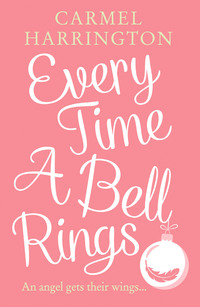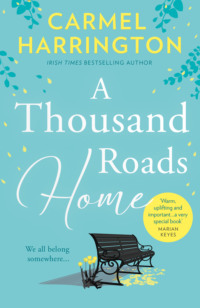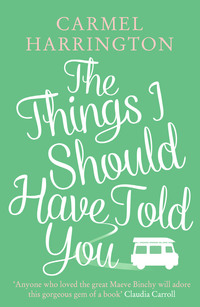
Полная версия
A Thousand Roads Home
TOM
Now
Bette Davis growled at the two kids who stopped to snigger at the sleeping Tom, who lay on his park bench, in his sleeping bag.
‘Bum!’ they jeered, until Bette growled a little louder and they ran away laughing. The dog moved closer to her best friend, keeping guard while Tom dreamed some more …
When one of Tom’s patients died, a young mother who had been battling breast cancer for years, Cathy was the only person he wanted to see. He didn’t want to talk about it. He didn’t want to analyse why it had happened. He just wanted to be with her. And Cathy instinctively got that. She simply fed him, held him and asked no questions. The following day, one of her day-care patients lost his temper and threw a chair through the patio window to the garden. Tom drove over to help her clear up the mess. While he understood that there were times that things happened that were beyond your control, he was terrified that she might ever be in danger. This terror clarified everything for him.
There were no longer any questions in his mind. He loved this woman and he wanted the world to know it. He plotted and planned the perfect proposal. He wanted to make it memorable, worthy of the woman he loved. But in the end, all his plans fell in disarray back in the deli aisle of Tesco where they’d first met.
‘This is where it all started!’ Tom said, looking at their single trolly this time.
‘One clash of our trollies and that was it,’ Cathy remembered with a smile.
‘You could never resist me. Me being such a charming fecker,’ Tom joked.
‘That is true,’ she answered, kissing him lightly. ‘Now, goat’s cheese-and-spinach pizza, or the triple meat feast?’ She held them both up, waving the goat’s cheese one in front of his face, which he duly pointed to.
‘Marry me,’ he blurted out. He couldn’t for the life of him see the sense in hanging around one more moment.
‘What?’
‘Will you marry me?’ He moved in closer. ‘I have been planning the most beautiful and perfect proposal, but I can’t wait a moment longer.’
‘Yes,’ she whispered.
‘Yes?’ he asked in disbelief.
‘Yes!’
He spun her around, lifting her off her feet. When he put her back down he realised they had gathered quite a crowd around them. ‘She said yes!’ he shouted loudly and they all cheered and whooped for him.
They had a small wedding a few months later on 18 October, the date they had met.
‘I only want people who love us in the church,’ Cathy stated. With just immediate family and friends, they exchanged vows in Cathy’s hometown of Donegal. She walked down the aisle on the arm of her proud father, to the sound of ‘Nella Fantasia’. There was a lot of love in that small church that day.
Cathy had invoked a speech ban for her father’s sake, a shy man, who hated any public speaking and was more at home on the farm. Tom should have been taken aback when she appeared on the stage, holding a microphone. But he wasn’t. His wife was unpredictable.
‘We said no speeches. Well, I said no speeches!’ she conceded when Tom raised one eyebrow. He walked close to the front of the stage, their guests moving in behind him.
‘There’s not enough love in this world, is there?’ Cathy asked the small group. And they all nodded in agreement. ‘I sometimes wake up at night and think, what if Tom hadn’t been in Tesco that Friday night, where would we be now? I am astonished that we found each other that night. I am astonished that we fell in love as quickly as we did. I am astonished that despite the whirlwind nature of those first few days, we never stopped in regret, realising we had been swept away. And I am astonished that despite my compulsive cleaning habits, my need to be right, my snoring – yes, my snoring – that Tom still loves me. I cannot wait for a lifetime of astonishments with you, Tom, my love, my friend, my confidant.’
In his sleep, on the cold, lonely park bench, a tear rolled down Tom’s cheek. Bette Davis’s ears pricked up, her sixth sense telling her that her master needed her. She moved in closer, licking his hand. She would never leave his side.
13
TOM
Tom didn’t like to make plans. He preferred to see where life took him. Over the past ten years it had been full of surprises. He looked up to the grey sky and thought to himself that it was highly unlikely that this beautiful world was done surprising him yet. Take today. On a whim, he hopped on the 41C bus. And on another whim, he jumped off in Swords village and decided to sleep there tonight. It had been years since he’d done that. He preferred to stay close to Fairview Park, the place he called home now. It was getting late. He walked over a stone bridge in the centre of this historic town, looking down at leaves drifting along the inky-blue water of the River Ward with its green grass banks on either side. Bette Davis sniffed an empty Coke can that poked its head through a cluster of weeds that sagged towards the river, as if in protest at the intrusion.
The sun had shone all day, a fine day for an Irish autumn, but even so, he pulled the collar of his grey overcoat upwards to form a barrier between the breeze and the back of his neck. He’d had a haircut last week and the hairdresser had been scissor happy. The haircut was a trade with Winnie, a woman he met in the Peter McVerry Trust. She was a semi-regular there like himself and they often chatted in the dining hall, both enjoying a good debate. As they discussed the horrific shooting that had occurred that month in Las Vegas, he’d noticed a gash on her hand, red and angry. Winnie was a proud woman and she would not allow him to clean and dress her wound unless she gave him something in return. A haircut was agreed.
Tom remembered another evening, years before, when he had driven over this same bridge in search of a petrol station. Cathy and he were on a road trip to Belfast and long before Applegreen Services were built to feed and water the travelling nation, diversions to small towns to hunt for fuel were the norm. The car radio was on. Cathy was singing along to a song with Gary Barlow and his Take That pals. What was it? Tom started to hum, trying to remember the lyrics, knowing it would irritate him for days until he remembered what it was.
Tom looked to his left where the ruins of a castle lay and where he’d spent a large proportion of today. Then to his right where shops and flats lined the path. The town was still busy, cars whizzing by the Main Street pavement. End-of-the-day shoppers and pedestrians moved fast with their heads down. He walked in the opposite direction. Away from all of that. He wanted a quieter area to settle down for the evening. As he explored the estates that surrounded the town the sun began to set. Headlights flooded the roads as cars made their way home after a busy day at work. He wandered into a large housing estate, which had a small cluster of shops in the middle of it. He looked at every doorway and entrance to see if he could find just the right spot to make his own for the night. Bingo. A doorway with a deep inset. Perfect. It belonged to a pharmacy that was now closed for the evening and would give him and Bette great shelter. He laid his rucksack down, guessing he’d walked nearly five or six kilometres today in all. They were both bone tired.
He heard footsteps before the shadow of their owner appeared around the corner. Bette’s ears pricked up and she whined. ‘Ssh,’ Tom commanded, and she laid her head down on his feet.
Tom watched a slender figure, dressed in black, walk their way. It had a hoody pulled up over its head. It covered half of the face so it was difficult to decipher gender. But there was something about the swagger that told tales on its owner. It was all boy, that swagger. A nervous one, at that, the way he looked around every few seconds as he walked.
Tom pondered his next move. He’d just found this sweet spot. He was warm and content exactly as he was. But experience had taught him that it was sensible to be upright when a young fella in a hoody walked by. He hated stereotypes with a passion, but as he’d had four different incidents with ‘hoodies’, all of which Tom came out of the worst, he felt he was justified. Before he had a chance to stand up, the figure walked by. He glanced towards where Tom stood with unseeing eyes. Tom realised that the shadowy inlet hid him.
Where was the hoody going? He watched him walk across the street and then stop in front of a block of flats. Maybe he was meeting some friends who lived here. If that was the case maybe it was time for Tom to make a move, find somewhere else to sleep for the night.
The boy had now come to a standstill in front of the long brick wall that surrounded the small concrete yard which sat in front of the flats. His rucksack now pulled off his back, he did another jerky scan of his surroundings. Every move was angry. He placed two spray-paint cans onto the ground beside him.
Tom felt the tension seep away from his shoulders. This boyo was likely working on his own. He’d do his thing, then with any luck piss off and Tom could start his evening meal. One he’d been looking forward to for hours now.
The trouble was he found he couldn’t take his eyes off the boy, who was staring at the walls of the flats, his head cocked to one side. Then when a car backfired from somewhere in the estate, the kid jumped at least two feet off the ground, landing with a thud and a clatter, dropping his cans. He glanced Tom’s way, again unseeing, but this time Tom managed to catch a look at the boy’s face. He was no more than ten or eleven. He looked scared. Something told Tom that he wasn’t watching a seasoned graffiti artist.
Without plan he was on his feet moving out of the dark shadow of his doorway. Bette jumped up and walked by his side, ready to defend her master if she needed to. The boy sensed he had company and spun around, his body tensed, two hands in fists, raised to his side ready for a fight.
‘What you want?’ the boy croaked, all bravado.
Tom stopped a few feet from him. He thought about that for a minute. What did he want? He was breaking all his own rules about keeping out of trouble, not getting involved. It had taken years for him to work out that best practice was just to turn round and walk away.
But there was something about this kid … He took another step forward as he said, ‘I’m just here to enjoy the show. Not often I get to see a young Banksy doing his thing.’
‘A what?’ Hoody replied.
‘Banksy.’
‘What’s that?’
Tom despaired of the youth sometimes. ‘He’s probably the world’s most famous vandal.’
This grabbed the attention of the kid. ‘Never heard of him.’
‘Well, I’d suggest you look him up. He’s a street artist at the top of his game.’
‘What makes him so special?’ Hoody asked.
‘He’s a political activist. He’s a commentator on culture. Some say a legend. He’s an enigma. As I said, you should look him up.’
The boy shrugged, then turned back to inspect the wall. He looked back with suspicion to Tom.
‘Don’t mind me,’ Tom said.
Hoody paused then shook the can with vigour, moving closer to the grey wall, ready to make his first mark.
‘Before you do that, do you want to smile for the camera?’ Tom asked.
Hoody spun round. ‘What camera?’
‘The CCTV. Well, there’s actually four cameras on this street, by my reckoning. It’s one of the reasons why I chose this spot to sleep tonight. It’s safe.’ Tom pointed to where the cameras lay.
‘Cameras don’t bother me,’ Hoody responded, but Tom noted that he’d not raised his spray-paint can again.
‘You’re right not to care. Banksy never did. A political activist, sure he never worried what anyone thought about his street art.’
Hoody looked at Tom a little closer. ‘What kind of stuff does this Banksy do?’
‘He uses stencilling. Strong images, but always coupled with even stronger messages. There’s a lot about his work to learn from. Like, for instance, his ape with a sign on him, that says, “Laugh now, but one day we’ll be in charge.” To me, that’s all about respect.’
‘For who?’
‘For everyone and everything. It’s telling us to be kind to each other and our environment. And really another way to say what my mam always used to preach: be careful who you step over on your way to the top, because you might need them, when you stumble back down again.’
The boy laughed. ‘I like that.’ Then his face changed and anger contorted his features into a grimace. ‘There’s someone I know who I’d like to see stumble on his way down.’
Tom wondered what had happened to the lad to cause him so much upset. ‘What message are you planning on sharing with the world today?’
Hoody shifted from one foot to the other. ‘Seamus Kearns is a fucking tool.’
‘Ah. That’s disappointing.’
‘Why?’
‘It’s lazy just shouting expletives, without giving any context to back them up.’
‘I never said I was a political activist!’ Hoody shouted.
‘No. That’s true, you didn’t. I’ll probably regret asking, but what did this Mr Kearns do to you?’
‘That used to be my bedroom.’ Hoody pointed to the upstairs window.
‘Used to be?’
‘Seamus Kearns was our landlord. He evicted me and Mam. And we couldn’t find anywhere else to live, so now we’re homeless.’
Tom felt his heart sink at this news. ‘And you want to graffiti his flat because he evicted you?’
Hoody nodded. ‘My mam, she’s scared, but she’s trying so hard to be brave. We’re in this hotel, which is a joke because it’s nothing like the hotels I’ve seen on TV. They have more rules than I have in school. And I have to share a room with my mam.’
Ten years on the streets of Dublin and Tom had watched more families than he could count go through exactly what this kid was going through right now. Emergency housing was not the Ritz, that was for sure.
‘Listen, I don’t know anything about your life, but I do know that getting arrested won’t do either of you any good. You said your mam was scared. Well, if you do this, it will make things worse for her.’
‘I have to do something,’ Hoody said.
Tom nodded. ‘I get that. You want to be the hero. But real heroes know when to walk away. And trust me, this is not the way.’ He nodded towards the CCTV cameras again. ‘It’s late. I suspect your mother is worried sick.’
‘I told her I was going to a mate’s this afternoon.’ He looked at his watch and frowned.
‘And did you go to your friend’s?’
‘For a bit. But he kept asking me when he could call over to my flat to watch YouTube. Over and over, banging on about it being my turn to have him come to my home. So I bailed.’
‘You didn’t tell him about your current situation?’
‘What do you think?’ The kid pulled a face. ‘I don’t want anyone to know.’
‘A good friend would understand,’ Tom said.
‘Maybe he’s not that good a friend,’ the kid said. He looked at his watch again. His mam would be looking for him. He said he would be home by seven o’clock and it was past that now.
He sighed then placed his paint can back into his rucksack. He turned to walk away, then stopped for a moment. ‘Thanks, mister. For the heads up about Big Brother watching. I owe you one.’
‘Do you know any Take That songs?’ Tom asked.
‘Nope. Mam likes all that golden oldie stuff, but not me.’
‘It’s going to annoy me until I think of that bloody song Cathy was singing,’ Tom muttered. ‘You’re going home?’ He realised he cared that this kid got back to his mother in one piece.
‘I don’t have a home. Not any more.’
‘Ah, but you do. Home isn’t a place. It’s a feeling. It’s what is up here and in here.’ He pointed to his head and heart. ‘Promise me you’ll try to remember that.’
The kid pulled his hoody up over his head and moved off into the night.
Конец ознакомительного фрагмента.
Текст предоставлен ООО «ЛитРес».
Прочитайте эту книгу целиком, купив полную легальную версию на ЛитРес.
Безопасно оплатить книгу можно банковской картой Visa, MasterCard, Maestro, со счета мобильного телефона, с платежного терминала, в салоне МТС или Связной, через PayPal, WebMoney, Яндекс.Деньги, QIWI Кошелек, бонусными картами или другим удобным Вам способом.







